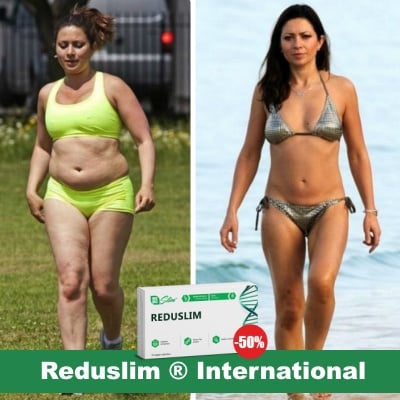Bulgaria, a country in Eastern Europe, has a very low life expectancy because of the high levels of obesity.
The prevalence of obesity in Bulgaria is among the highest in Europe, and there is a 30% chance that someone will die from heart disease resulting from obesity.
Obesity in Bulgaria is a significant cause for concern because it is predicted that by 2030, 50% of people under the age of 45 will be obese. According to a study by the American Journal of Preventive Medicine, obesity rates in Bulgaria range from 3 to 10%. However, women aged 40 and 59 are most likely to be obese at 36%, while men are more likely to be obese at 13-14%.
Table of Contents
Reduslim Weight Loss Supplement In Bulgaria
Reduslim is an all-natural weight loss supplement in Bulgaria. It helps consumers in many ways, e.g., it decreases the risk of cardiovascular disease, diabetes, and cancer.

It also reduces the risk of neurodegenerative disorders like Alzheimer’s and dementia.
Reduslim is a dietary supplement that helps you lose weight. It was developed by experts working in the field of medicine, nutrition, and weight management.
→ Would you please read our full review about Reduslim in Bulgaria?
It is a weight loss supplement that is made in Bulgaria. It has both natural and herbal ingredients, which make it safe for consumption.
One of the ingredients in Reduslim is Garcinia Cambogia, which helps people to reduce their appetite.
It contains some natural ingredients that are intended to aid weight loss. The FDA does not approve the supplements, but they include other components found in food items, such as pumpkin seeds, maca root, and green tea extract.
Overweight in Bulgaria: The International Trend
Obesity in Bulgaria is a growing issue. The rise of obesity has been linked to a higher life expectancy and economic success. Though, this demographic shift is only seen in the rural areas of the country. It is a highly populated country with a very mobile population, which means that obesity could cause health problems even in the rural areas where it’s not as prevalent.
Bulgaria is one of the most overweight countries in Europe. The countries body mass index (BMI) is 27. This is an average of 25.
Many reasons contribute to this statistic.
- One of the factors constantly mentioned in the media is that Bulgarians are not healthy when they go out to eat at fast-food restaurants and restaurants with low-quality food, but instead prefer Russian cuisine, which contains high amounts of fat and calories.
- Another factor is that there’s a lack of physical activity in Bulgaria. So people mostly prefer to sit down all day long watching TV or working on their computers and tablets.
The World Health Organization states that between 1980 and 2016, there has been an almost 50% increase in global BMI scores.
Bulgarian Women And Weight Loss in Europe
With the prevalence of obesity, many women are having health concerns about their weight. These women use online platforms to share their stories of weight loss struggles and success, which inspire other women to lose weight.
Burning fat is not an easy thing to do. It takes a lot of dedication, time, and hard work for it to be successful. Many women have tried different methods for losing weight but do not see any results that they wanted.
Bulgaria has the highest number of overweight women in the European Union, with 36 percent of them being obese. In comparison to this statistic, the United States only has a 17.5 percent obesity rate.
The rise in obesity rates in Bulgaria (PDF) is due to cultural and societal factors that promote unhealthy eating habits, including poor access to affordable healthy food and a sedentary lifestyle. Bulgaria has no special programs or policies for tackling obesity or weight-loss-related health concerns.
On average, Bulgarian women weigh around 38 kilograms. This is the highest in Europe and indicates a poor lifestyle and diet in the country.
Bulgaria has one of the lowest GDP per capita, which is a significant concern regarding health and health care costs. The heaviest woman in Europe was found in Bulgaria, where they weigh on average 38 kilograms!
Treating Overweight Issues With Food & Exercise
With obesity on the rise, people are trying to find ways to treat it. Weight management is something that isn’t just about diet and fitness for obese individuals.
The weight loss gym routine presented here, is a fitness plan that helps individuals lose weight and get into shape. It involves five days of training, three days of fasting, and one day of rest. The best time for a male to begin the weight loss routine is after training for at least four weeks.
Many people have turned to food and exercise as a way to manage or slow down their weight. However, obesity is not just about eating less and exercising more. Genetic predisposition, environmental factors, metabolic issues, etc., can affect weight, so it’s essential to keep these in mind when looking for ways to treat it.
Many organizations are offering assistance with the treatment of obesity through programs like Weight Watchers or Nutrisystem. These programs provide various kinds of service with food intake and exercise to help obese people reach their desired weight goals which makes them much easier than trying to do this on your
Weight management is a common issue for overweight people in Bulgaria. There are many treatment methods out there, but most are either invasive or require too much time commitment.
Treating obesity is a complicated process involving patience and dedication from both the patient and health care providers. The main goal of weight loss treatment involves eating less while exercising more regularly to lose weight and improve overall health.
The crisis is so severe that some countries have started to take action, such as banning fast-food chains from campuses, shaming people who overeat and requiring healthier foods such as fresh fruit or vegetables at school lunches.
Bulgarian Health Care System and Obesity Treatment
Bulgaria is a country with extremely high rates of obesity and type two diabetes. The Bulgarian health care system has been working on ways to treat their patient population. The government has been funding several significant studies and clinical trials, trying to find new and innovative solutions for their patients. One such solution they found is gastric bypass surgery which is 60% effective in preventing weight regain.
Bulgarian treatment for obesity includes medications, dieting, surgery, and lifestyle changes. While these methods have varying success rates, they offer an alternative solution for those who need it most.
The Bulgarian treatment for obesity has been quite popular since it first came out five years ago. It doesn’t only help the obese, but also those who want to lose weight and those with diabetes. The treatment is a very effective method for weight loss and helps people make lifestyle changes to avoid long-term complications of obesity – which starts with an initial consultation.
Bulgaria’s health care system is characterized by its longevity in terms of healthcare that dates back to ancient times. It is often criticized for its high cost, but it offers comprehensive coverage with low fees compared to most other countries.
What Health Problems Do Overweight Bulgarians Face?
Obesity is not a rare health issue in the world today. It is also becoming more prevalent in Bulgaria, with the most significant number of obese people per capita.
Weight-related health problems are becoming increasingly common in Bulgaria since it has one of the highest rates of obesity among its population. The country’s obesity rate is 17%. Bulgarians are more likely to suffer from type 2 diabetes, cardiovascular disease, and cancer. They are also at a higher risk for musculoskeletal disorders and, overall, lower life expectancy.
The current prevalence of obesity in Bulgaria is 35.2%, and it has created a lot of health problems for the country. The country’s health system grapples with many issues related to the obese population and is struggling to deal with these problems.
Food Industry Struggles to Improve Public Health in Bulgaria
With many Bulgarians living in poverty and changing dietary habits, public health is becoming a big issue. The food industry is struggling with the growing demand for healthy foods, putting pressure on producers to improve their product quality, develop new products, and generate income.

The food industry has always struggled to develop innovative products that would help people stay healthy and provide quality diet options while still being affordable for consumers. The industry is trying to do this by introducing healthier diets and new products while also improving its marketing strategies to make people aware of these new options.
The Bulgarian food industry has gone through several transformations to try and improve public health since the 1990s. Significant changes have been in the direction of healthier products and reducing processed sugars.
In addition to healthy products, some restaurants offer more nutritious options for their customers to reduce the prevalence of obesity in society.
The Future of Healthcare in Bulgaria is Unclear with the Increase in Body Mass Indexes
With the rapid increase in the number of overweight and obese people in Bulgaria, healthcare providers are becoming more challenging to provide adequate care.
Healthcare providers are struggling to keep up with the needs that patients have. They are trying out all means possible, but they need more support from government authorities and other stakeholders to help them build a better health care system.
BMI is a term used to measure obesity in adults and children. With the increase in obesity, healthcare in Bulgaria is unclear, with more BMIIs increasing annually.
For Bulgaria’s healthcare system to be prepared for the future, they need to focus on prevention and treatment options.
